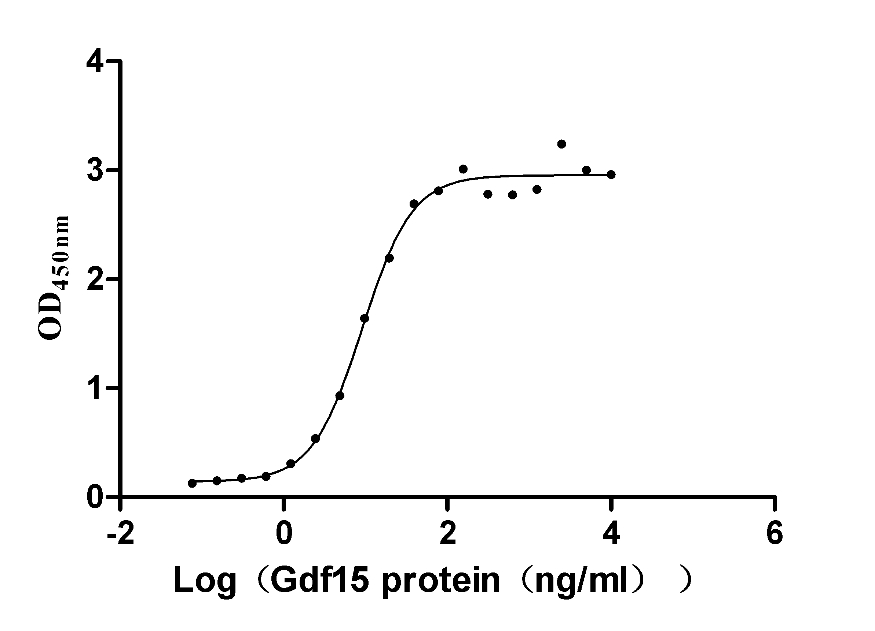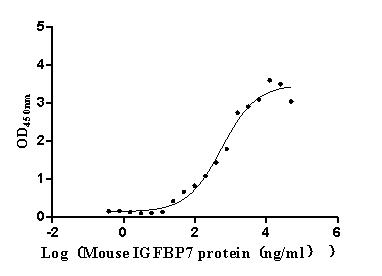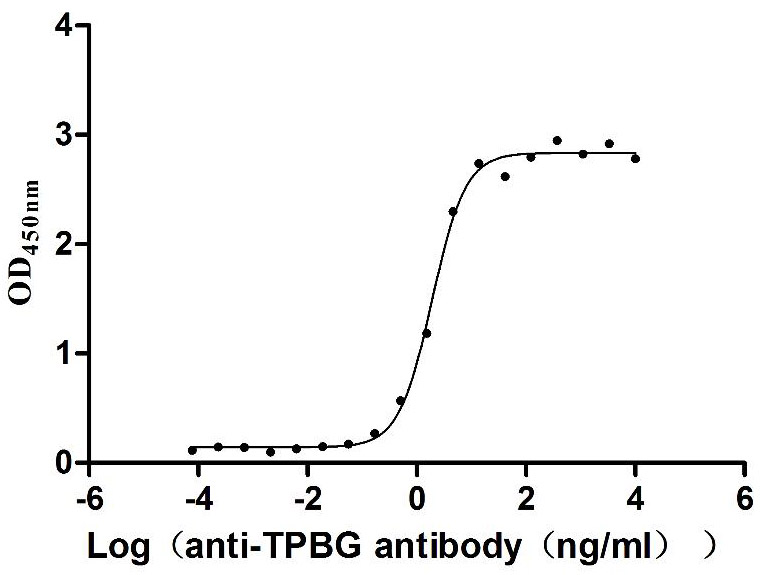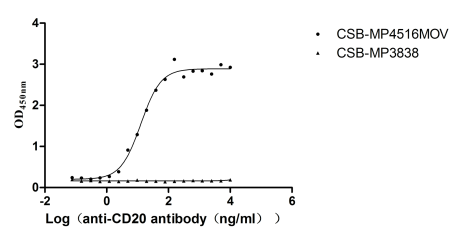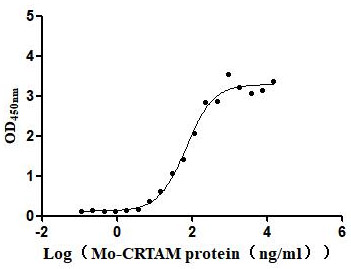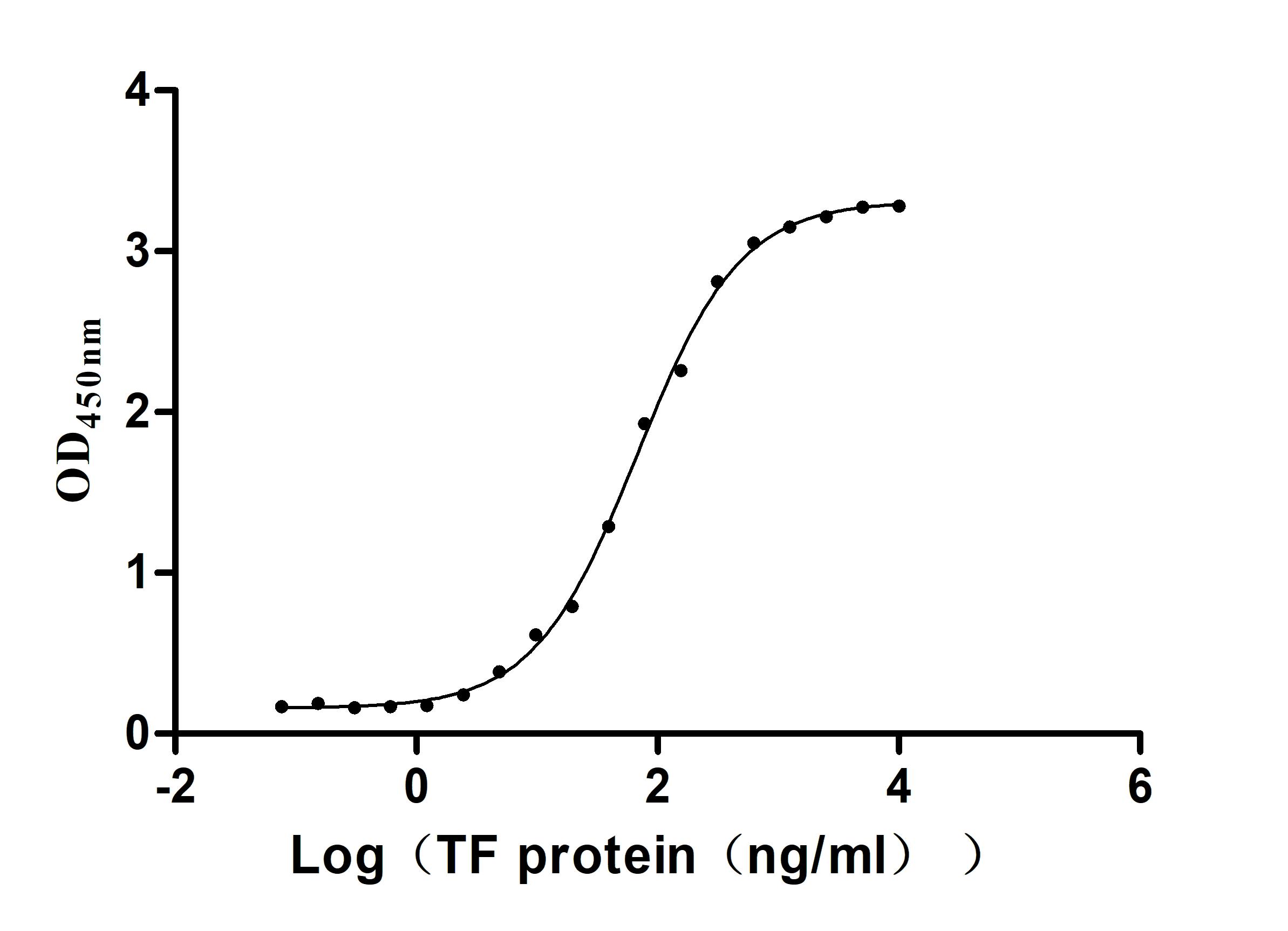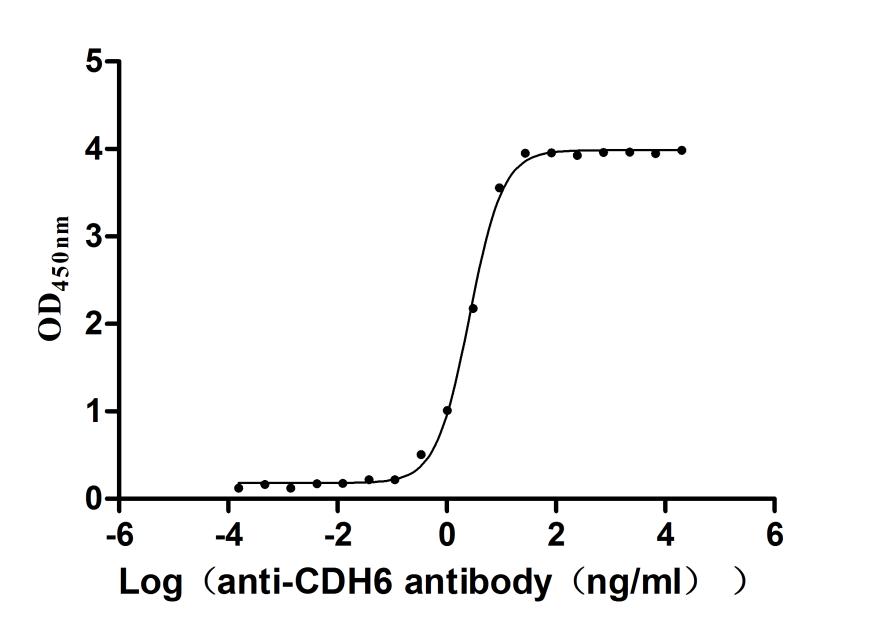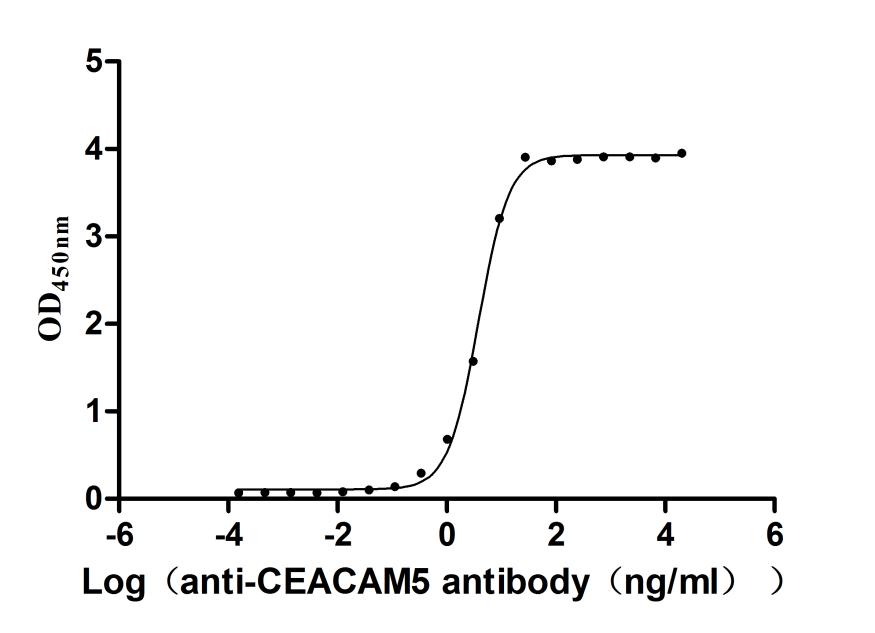Recombinant Mouse Pituitary-specific positive transcription factor 1 (Pou1f1)
-
货号:CSB-YP018391MO
-
规格:
-
来源:Yeast
-
其他:
-
货号:CSB-EP018391MO
-
规格:
-
来源:E.coli
-
其他:
-
货号:CSB-EP018391MO-B
-
规格:
-
来源:E.coli
-
共轭:Avi-tag Biotinylated
E. coli biotin ligase (BirA) is highly specific in covalently attaching biotin to the 15 amino acid AviTag peptide. This recombinant protein was biotinylated in vivo by AviTag-BirA technology, which method is BriA catalyzes amide linkage between the biotin and the specific lysine of the AviTag.
-
其他:
-
货号:CSB-BP018391MO
-
规格:
-
来源:Baculovirus
-
其他:
-
货号:CSB-MP018391MO
-
规格:
-
来源:Mammalian cell
-
其他:
产品详情
-
纯度:>85% (SDS-PAGE)
-
基因名:Pou1f1
-
Uniprot No.:
-
别名:Pou1f1; Pit-1; Pit1; Pituitary-specific positive transcription factor 1; PIT-1; Growth hormone factor 1; GHF-1
-
种属:Mus musculus (Mouse)
-
蛋白长度:Full length protein
-
表达区域:1-291
-
氨基酸序列MSCQSFTSAD TFITLNSDAS AALPLRMHHS AAECLPASNH ATNVMSTATG LHYSVPSCHY GNQPSTYGVM AGSLTPCLYK FPDHTLSHGF PPLHQPLLAE DPAASEFKQE LRRKSKLVEE PIDMDSPEIR ELEQFANEFK VRRIKLGYTQ TNVGEALAAV HGSEFSQTTI CRFENLQLSF KNACKLKAIL SKWLEEAEQV GALYNEKVGA NERKRKRRTT ISVAAKDALE RHFGEHSKPS SQEIMRMAEE LNLEKEVVRV WFCNRRQREK RVKTSLNQSL FSISKEHLEC R
-
蛋白标签:Tag type will be determined during the manufacturing process.
The tag type will be determined during production process. If you have specified tag type, please tell us and we will develop the specified tag preferentially. -
产品提供形式:Lyophilized powder
Note: We will preferentially ship the format that we have in stock, however, if you have any special requirement for the format, please remark your requirement when placing the order, we will prepare according to your demand. -
复溶:We recommend that this vial be briefly centrifuged prior to opening to bring the contents to the bottom. Please reconstitute protein in deionized sterile water to a concentration of 0.1-1.0 mg/mL.We recommend to add 5-50% of glycerol (final concentration) and aliquot for long-term storage at -20℃/-80℃. Our default final concentration of glycerol is 50%. Customers could use it as reference.
-
储存条件:Store at -20°C/-80°C upon receipt, aliquoting is necessary for mutiple use. Avoid repeated freeze-thaw cycles.
-
保质期:The shelf life is related to many factors, storage state, buffer ingredients, storage temperature and the stability of the protein itself.
Generally, the shelf life of liquid form is 6 months at -20°C/-80°C. The shelf life of lyophilized form is 12 months at -20°C/-80°C. -
货期:Delivery time may differ from different purchasing way or location, please kindly consult your local distributors for specific delivery time.Note: All of our proteins are default shipped with normal blue ice packs, if you request to ship with dry ice, please communicate with us in advance and extra fees will be charged.
-
注意事项:Repeated freezing and thawing is not recommended. Store working aliquots at 4°C for up to one week.
-
Datasheet :Please contact us to get it.
靶点详情
-
功能:Transcription factor involved in the specification of the lactotrope, somatotrope, and thyrotrope phenotypes in the developing anterior pituitary. Activates growth hormone and prolactin genes. Specifically binds to the consensus sequence 5'-TAAAT-3'.
-
基因功能参考文献:
- The increase uptake of pentavalent arsenic in diabetic mouse tissues may be associated with increased PIT1 and/or PIT2 expression. PMID: 29216956
- We thereby analyzed multiple genomic publications related to POU1F1 and pituitary development in this study to identify genes and agents regulating POU1F1 lineage cell differentiation. PMID: 27709372
- A missense POU1F1 mutation is associated with isolated growth hormone deficiency. PMID: 26612202
- The maintenance conformation at the Pit-1 chromatin locus is dependent on autoregulation by Pit-1 protein. PMID: 25691665
- Mice with hypomorphic expression of the sodium-phosphate cotransporter PiT1/Slc20a1 have an unexpected normal bone mineralization. PMID: 23785462
- Results suggested that Pit-1 w could be involved in the paracrine/autocrine system in mice and may be necessary for normal testicular function via its possible role in regulating PRL expression in testicular germ cells. PMID: 22634956
- Significant differences in gene expression were noted between each mutant and their normal littermates, as well as between Prop1 and Pit1 mutants. PMID: 21828248
- Mouse Pit-1 w plays a role in spermatogenesis. This is the first report demonstrating the expression of Pit-1 variants arising from alternative promoters in mammals. PMID: 21745476
- Data show that the PiT-1 embryos displayed anemia, a defect in yolk sac vasculature, and arrested growth, and indicate that PiT-1 has a necessary, nonredundant role in embryonic development. PMID: 19882669
- Pit1 mutation may result in physiological homeostasis that favors longevity PMID: 12020945
- the Pit1 mutation results in a decreased activity of the insulin/IGF-1 pathway and plays a key role in the longevity of the Snell dwarf mouse PMID: 12020946
- multiple domains of Pit-1 are required for full synergy with GATA-2 and sequences between the two binding sites contribute to co-occupancy with both factors on the proximal TSH beta promoter PMID: 12385825
- specificity protein-1, PPARgamma, and pituitary protein transcription factor-1 have roles in transcriptional regulation of the murine CORS-26 promoter PMID: 15157741
- Down-regulation of protein synthesis may be an important characteristic of the Pit-1 mutation and longevity of the Snell dwarf mouse. PMID: 15541773
- The redistribution of co-repressor complexes by Pit-1 might represent an important mechanism by which transcription factors direct changes in cell-specific gene expression. PMID: 16030140
- TSHbeta gene is maximally activated by a combination of TRAP220, Pit-1, GATA-2 that act via both protein-DNA and protein-protein interactions. PMID: 16396960
- selective increase in expression of type III Pi transporters Pit-1 results in BMP=2 mediated Pi transport activity PMID: 16734382
- Atbf1, serves as a novel pituitary regulator for one of the two required enhancers as shown by genetic and in vitro analysis PMID: 18272476
- Deafness and permanently reduced potassium channel gene expression and function in hypothyroid Pit1dw mutants. PMID: 19176829
显示更多
收起更多
-
相关疾病:Defects in Pou1f1 are the cause of the dwarf (dw) phenotype which interrupts the normal development of the anterior pituitary gland, resulting in the loss of expression of growth hormone, prolactin and thyroid-stimulating hormone, and hypoplasia of their respective cell types.
-
亚细胞定位:Nucleus.
-
蛋白家族:POU transcription factor family, Class-1 subfamily
-
数据库链接:
KEGG: mmu:18736
STRING: 10090.ENSMUSP00000135113
UniGene: Mm.355440
Most popular with customers
-
Recombinant Mouse GDNF family receptor alpha-like (Gfral), partial (Active)
Express system: Mammalian cell
Species: Mus musculus (Mouse)
-
Recombinant Mouse Complement component C1q receptor (Cd93), partial (Active)
Express system: Mammalian cell
Species: Mus musculus (Mouse)
-
Recombinant Macaca fascicularis Trophoblast glycoprotein (TPBG), partial (Active)
Express system: Mammalian cell
Species: Macaca fascicularis (Crab-eating macaque) (Cynomolgus monkey)
-
Recombinant Macaca fascicularis Membrane spanning 4-domains A1 (MS4A1)-VLPs (Active)
Express system: Mammalian cell
Species: Macaca fascicularis (Crab-eating macaque) (Cynomolgus monkey)
-
Recombinant Mouse Cell adhesion molecule 1 (Cadm1), partial (Active)
Express system: Mammalian cell
Species: Mus musculus (Mouse)
-
Recombinant Human Serotransferrin(TF) (Active)
Express system: Mammalian cell
Species: Homo sapiens (Human)
-
Recombinant Human Cadherin-6(CDH6),partial (Active)
Express system: Mammalian cell
Species: Homo sapiens (Human)
-
Express system: Mammalian cell
Species: Macaca mulatta (Rhesus macaque)


